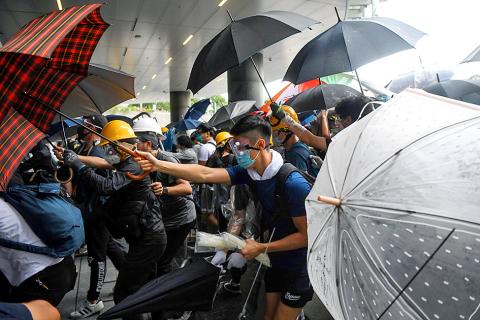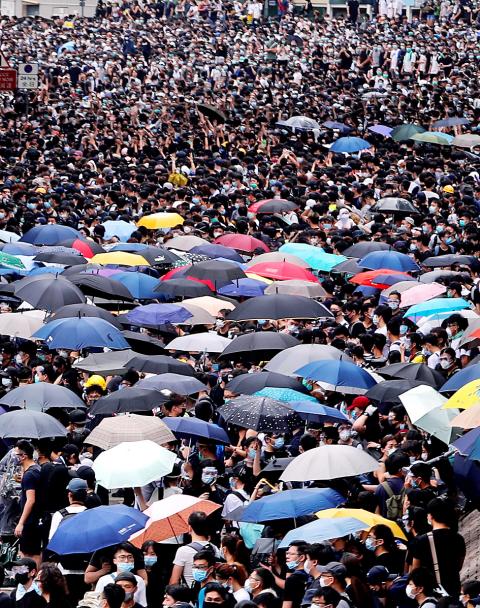Hong Kong police yesterday fired tear gas and rubber bullets at protesters who had massed outside government headquarters in opposition to a proposed extradition bill that has become a lightning rod for concerns over greater Chinese control in the territory.
The violence came after protesters earlier in the day forced the delay of a legislative debate over the bill, which would allow criminal suspects in Hong Kong to be sent for trial in China.
The mainly young crowd had overflowed onto a major road as they overturned barriers and tussled with police outside the government building, but when some appeared to have breached a police cordon around the building, the police launched their response, which also included firing pepper spray and water hoses.

Photo: AFP
Earlier, a curt government statement said that the legislative session scheduled to begin at 11am would be “changed to a later time.”
Officials gave no indication of when that would be and Hong Kong Chief Executive Carrie Lam (林鄭月娥) canceled a scheduled news briefing.
Some businesses closed for the day, and labor strikes and class boycotts were called.

Photo: Reuters
At a brief news conference, Hong Kong Police Commissioner Stephen Lo (盧偉聰) called the demonstration a riot, potentially meaning long jail terms for anyone arrested.
“We condemn such irresponsible behavior,” Lo said. “There’s no need to hurt innocent people to express your opinions.”
Protesters were seen throwing rocks, bottles, metal barricades and other projectiles at police.
Police spokesman Kong Wing-cheung (江永祥) defended the decision to use non-lethal weapons, saying that officers would not have had to do so if they were not facing a serious threat.
The state of the legislative process remained unclear following the violence, which had largely ended by about 5pm after police herded demonstrators across a pedestrian bridge.
However, traffic in one of the busiest parts of the territory remained blocked and several hundred protesters seemed in no hurry to leave.
Earlier in the day, protesters said that they hoped the blockade would persuade Lam’s administration to shelve the amendments.
Dressed in black T-shirts and jeans, many protesters appeared undaunted by demands to disperse from police.
They also seemed mindful of Beijing’s growing use of electronic surveillance such as facial recognition technology to build dossiers on those it considers politically unreliable, with many donning surgical masks to hide their features, as well as to safeguard against tear gas.
Hong Kong residents can face travel bans and other repercussions if they cross the border into mainland China.
“Most of these protesters don’t expect the government to compromise. They just want to express their own opinions,” said Joseph Cheng (鄭宇碩), an observer of Chinese and Hong Kong politics now retired from the City University of Hong Kong. “The anger is still there and the anger will burst again at the next opportunity.”
The government pushed ahead with plans to present the amendments to the legislature yesterday, despite a weekend protest by hundreds of thousands of people.
Lam has defended the legislation as necessary to close legal loopholes with other countries and territories. A vote is scheduled on Thursday next week.
At a regular briefing, the Chinese Ministry of Foreign Affairs repeated its support for the bill.
Spokesman Geng Shuang (耿爽) also denied that Beijing has been interfering in the territory’s affairs in a way that contravenes agreements made when Hong Kong was handed back to China.

AIR SUPPORT: The Ministry of National Defense thanked the US for the delivery, adding that it was an indicator of the White House’s commitment to the Taiwan Relations Act Deputy Minister of National Defense Po Horng-huei (柏鴻輝) and Representative to the US Alexander Yui on Friday attended a delivery ceremony for the first of Taiwan’s long-awaited 66 F-16C/D Block 70 jets at a Lockheed Martin Corp factory in Greenville, South Carolina. “We are so proud to be the global home of the F-16 and to support Taiwan’s air defense capabilities,” US Representative William Timmons wrote on X, alongside a photograph of Taiwanese and US officials at the event. The F-16C/D Block 70 jets Taiwan ordered have the same capabilities as aircraft that had been upgraded to F-16Vs. The batch of Lockheed Martin

GRIDLOCK: The National Fire Agency’s Special Search and Rescue team is on standby to travel to the countries to help out with the rescue effort A powerful earthquake rocked Myanmar and neighboring Thailand yesterday, killing at least three people in Bangkok and burying dozens when a high-rise building under construction collapsed. Footage shared on social media from Myanmar’s second-largest city showed widespread destruction, raising fears that many were trapped under the rubble or killed. The magnitude 7.7 earthquake, with an epicenter near Mandalay in Myanmar, struck at midday and was followed by a strong magnitude 6.4 aftershock. The extent of death, injury and destruction — especially in Myanmar, which is embroiled in a civil war and where information is tightly controlled at the best of times —

China's military today said it began joint army, navy and rocket force exercises around Taiwan to "serve as a stern warning and powerful deterrent against Taiwanese independence," calling President William Lai (賴清德) a "parasite." The exercises come after Lai called Beijing a "foreign hostile force" last month. More than 10 Chinese military ships approached close to Taiwan's 24 nautical mile (44.4km) contiguous zone this morning and Taiwan sent its own warships to respond, two senior Taiwanese officials said. Taiwan has not yet detected any live fire by the Chinese military so far, one of the officials said. The drills took place after US Secretary

THUGGISH BEHAVIOR: Encouraging people to report independence supporters is another intimidation tactic that threatens cross-strait peace, the state department said China setting up an online system for reporting “Taiwanese independence” advocates is an “irresponsible and reprehensible” act, a US government spokesperson said on Friday. “China’s call for private individuals to report on alleged ‘persecution or suppression’ by supposed ‘Taiwan independence henchmen and accomplices’ is irresponsible and reprehensible,” an unnamed US Department of State spokesperson told the Central News Agency in an e-mail. The move is part of Beijing’s “intimidation campaign” against Taiwan and its supporters, and is “threatening free speech around the world, destabilizing the Indo-Pacific region, and deliberately eroding the cross-strait status quo,” the spokesperson said. The Chinese Communist Party’s “threats